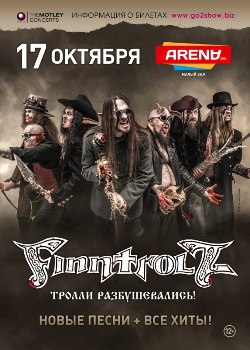Finntroll! Viking Metal and the War Against Irony

There’s a half-naked man on stage and he’s got pointed ears — not the rubber Vulcan/Elf ears you see at parties; full on floppy troll ears. More importantly, he’s not doing this for comic effect. He addresses the crowd in a crisp Finnish accent; “Did anybody buy the album!”
Incoherent roars and yells from the pit where long-haired students wait to “mosh.”
Somebody must have boasted about getting a pirate download because Mathias – Finntroll‘s lead singer – shoots back levelly, “#### you, sir. We have the vinyl over there. You can go buy it right now.”
Perhaps the pirate retorts that information wants to be free, or that musicians should play for the love of it. If he does, his words are lost because the music starts.
Gamer Dad and I have hauled ourselves to the Classic Grand in Glasgow, a city which reminds me of late Constantinople; the inhabitants live out a vibrant life amid the crumbling relics of Victorian glory, repurposing old buildings until the very scars in their fabric tell the sagas of lost milieus. This venue started life in 1915 as a cinema. Now it’s a rather good rock club.
We 40-something dads have the shortest hair in the room and are at the upper end of the demographic, but we don’t care. We’re here to see Tyr, who are playing support tonight. They’re more melodic than their cohorts and sing about Viking gods and the old ways. Robert E. Howard would approve (but that’s another story). However, we’re in no rush to get our train. We stay for the main act.
Finntroll are… not easy listening.
The growling vocals are a percussion instrument. Imagine if the Cookie Monster joined a Madness tribute band and persuaded them to adopt a heavier guitar sound while he rapped. Better yet, go dig out some of their performances on Youtube (I can’t promise that the lyrics are “worksafe” because I have no idea what they were), except you won’t get the live experience. Finntroll have a magnetic stage presence with a Nosferatu-Northern European undertow. The sound envelopes you, makes your chest vibrate. The effect is similar to those drum-only performances so beloved of arts festivals, but with more electric guitar. Down in the pit, people form a conga and then “mosh,” jumping and jostling so that dancers fly around in a good-natured human simulation of Brownian motion. A few brave souls even crowd surf.
And those pointy ears? They stay on while the band head bang, whirling their long hair and here’s the thing: There’s no irony, no sense that we must be oh-so-clever about this.
What’s going on here? The mosh pit is packed with students who have the intellectual and rhetorical skills to point out that the Emperor — well the Viking Metal star — has no clothes on. (What? No Post Modern deconstruction?)
In the interval, I get chatting to the young couple next to us. Both students, both sword folk, and he’s a good enough smith to forge his own arrowheads. As we talk, a woman walks past in a maille dress and I’m reminded that, queuing outside earlier, we overheard the banter of gamers and roleplayers.

These fans just want to enjoy their tropes (that is, the elements that identify their genre). The opposite of “hipsters,” they’ve rejected irony in favor of immediacy and personal authenticity. I think they can teach something useful to those of us who want to take the Pulp-era traditions into the 21st century.
Irony has its artistic place, but it too easily becomes a parasite sucking the life out of any authentic experience — “Oh look, I’m wearing this hat, but ironically!” No need to commit, no need to embrace or identify with your genre. Worse, when people start producing a genre ironically, it has the effect of slashing and burning through the available creative space — “This is not just a hat, it is an ironic hat that simultaneously confers the benefits of hat wearing while making it impossible for other people to wear hats non-ironically without looking and feeling silly.”
This is, I think, what happened to Sword and Sorcery.
As an 80s teenager, I caught the aftershock of the Sword and Sorcery boom, gleefully scooping up the battered paperbacks that had leached away from the shelves of bookstores to languish in yard sales and charity shops. But once I got to university, such books were passe, to be enjoyed with a knowing wink and references to parodies such as Cerebus the Aardvark. Then the Tough Guide to Fantasyland came along to drive the last nails through the limbs of the Sacred Genre.
It’s a cultural Tragedy of the Commons. Like sneaking another sheep onto the shared grazing land, one person’s ironic detachment confers an advantage on the individual — in this case a social one — but helps to destroy the shared resource until, “OMG! All our tropes are cliches!”
Viking Metal fans seem to have always understood that you must make a positive decision to take a genre seriously. They grow their hair long, cover themselves in tattoos, wear band T-shirts with runes on. Meanwhile, the bands themselves make videos dressed as Vikings, even performing from the deck of a dragon-prowed longship (caveat; linked video may offend Christian viewers).
You could call these people preposterous, eccentric, anachronistic, but you’d be missing out on the fun.
Now think of the success stories of what these days we call “Heroic Fantasy.” Joe Abercrombie’s yarns might be gritty and dark, but they also have wizards and berserks in them. Patrick Rothfus is a master of prose and character, but he uses a tavern as a framing story — supposedly an ultimate no-no — and sends his protagonist to wizard school. He even has a “hot bard babe” straight out of a teenage game of D&D. Then there’s George RR Martin who writes grim epics, not just about kings, knights, and princesses, but also zombies and dragons.
If you insist, you could call these books cliche-ridden. It would certainly make you sound smart. However — again — you’d be missing out on the fun.
And this is the lesson Viking Metal can teach us: Deliver the tropes and do it straight.
M Harold Page (www.mharoldpage.com) is a Scottish-based writer and swordsman. His debut novel The Sword is Mightier came out last month. His Foreworld SideQuest, Marshal versus The Assassins is available on Amazon for preorder.
Reminds me of the computer game of the late 90’s Called Pyst.-What happens when 43 Million people come to your island. Good cracking post!
Do it straight seems like a good credo for writers and bands. It’s why I love the band the Sword and or a good Roger Dean album cover.
Irony can eat up everything. To see through all things is the same as being blind.
I’m either stupid or really unhip. I have no idea what this post is about.
How does one wear anything ironically? It’s clear the author thinks of this in some negative way; but it’s completely unclear to me what that way is.
We’re all unhip, or we wouldn’t be on this page!
Alas, you can wear a hat ironically: http://www.urbandictionary.com/define.php?term=hipster%20irony
“I’m wearing this hat but as a kind of goofy joke…”
Possibly I have articulated these thoughts badly, for which I apologize. I think of irony as a mostly negative thing because of how it manifests in SF&F circles:
(1) Reading books in order – ostensibly – to laugh at them, and (2) Producing literature that uses the tropes while at the same time as poking fun at them. In both, irony gives readers “permission” to enjoy the tropes without identifying as a true consumer of such literature.
Ah! Thanks for the clarification. This now makes sense!
Perhaps I just didn’t read it close enough; but again, thanks for taking the time to clarify.
On the contrary, thanks for reading my clarification! The nice thing about blogging is the short feedback loop.
Are you reading Rusty & Co? At one point someone releases the kraken — ironically.
One of the villains, of course.
Made me laugh.
[…] 13th century saga–strictly speaking an excerpt from a Norse history — that has its own Viking Metal soundtrack (or by Thor it […]
[…] wearing headphones in a coffee shop, through to retreating to your computer cupboard and using growly Heavy Metal to keep out visiting older relatives while swearing inventively at children who pester you (top tip: […]